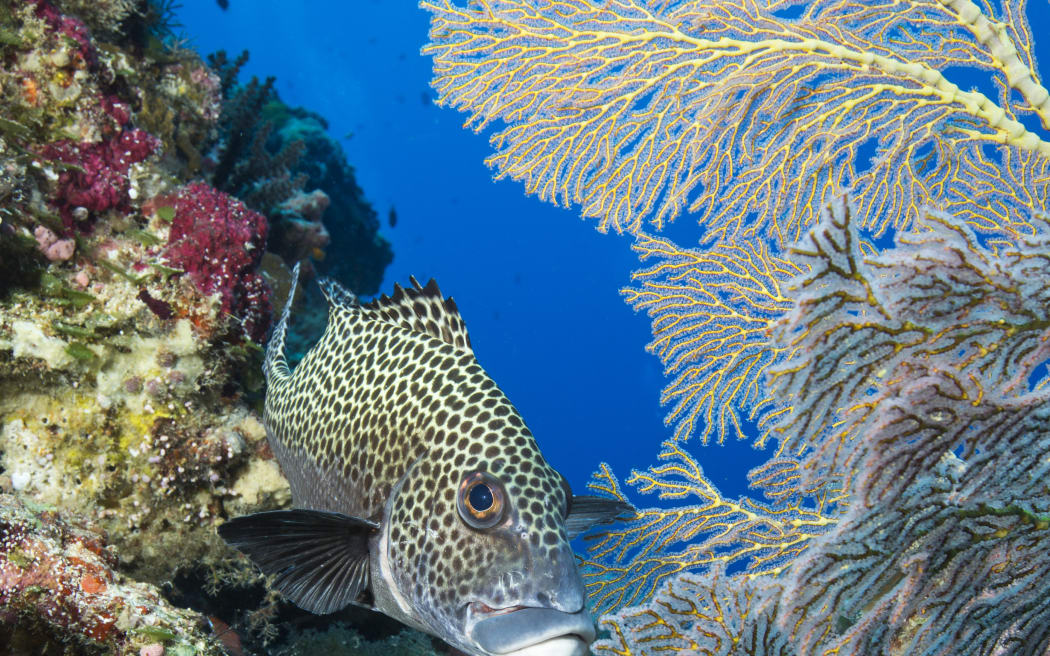
Spotted sweetlips in Palau Photo: Richard Brooks/ The Pew Charitable Trusts
Marine protected areas (MPAs) are economically beneficial to both fishing and tourism, according to a new study published in a international journal on marine sciences, Scientia Marina.
The new findings come as Palau plans to shrink its marine sanctuary in a bid to improve commercial fisheries revenue.
The new research titled Evidence of economic benefits from marine protected areas provides 48 examples of fishery-related benefits in 25 countries, and 31 of tourism-related economic benefits in another 24 countries.
The paper found that there was no evidence of net costs of MPAs to fisheries anywhere.
"Fishery benefits included increased fish stocks, catch volumes, catch per unit effort, fecundity and larval export, and larger fish and lobsters," it said.
The study found that well-designed and enforced MPAs provides sustainable benefits for fishing communities and even sub-optimally designed MPAs can provide economic advantages.
"MPAs represent one of the best strategies for maintaining the sustainable exploitation of marine resources," it said.
'Accidental benefit'
Lead author Professor Mark Costello said MPAs are simple, cheap to manage and effective at protecting stock.
"You constantly hear this refrain that marine reserves push fisherman away, fisherman lose out and there's even economic models that assume fisheries lose income or lose catch due to the marine reserves and yet I couldn't find any examples of this," Costello said.
"We found examples in 25 different countries, from coral reefs, to kelp forests, to all kinds of habitats so I think what this study shows is that this is a general truth - that marine reserves do benefit fisheries.
"What's even more amazing is they're usually not designed to benefit the fishery so it's kind of an accidental benefit."
Costello likens MPAs and fisheries to someone putting money in the bank and living off the interest.
"[MPAS] provide that refuge for their stocks to help stabilize the population and the progeny of those fish and lobsters and other animals spill over to the fishery right beside it."
Palau needs the money
However, President Surangel Whipps Jr said the Palau needed the money it had lost from commercial fishing after turning 80 percent of its economic exclusive zone (EEZ) into a marine sanctuary in 2015.
"We basically lost US$3 million a year out of our national budget, these are fisheries licences and economic activities and taxes that we collect off of this that were going into funding schools and the hospital, gone away, gone to zero."
Whipps said despite its plan to shrink its marine reserve 30 percent of its waters would remain protected but its entire EEZ would be "100 percent managed".
He said this meant sharks, whales, turtles and rays would be protected and at least 30 percent of the most critical areas would remain off limits to commercial fishing.
"Ultimately the goal should be how do we use the resources sustainably so you can continue to fish and help not only Palau but the planet."
Taking care of people
Whipps said "jetset conservation groups" who did not know what life is like in Palau offer their opinion on what should be done.
He said they have more interest in awards than well managed oceans.
"To come in to Palau and say, 'we want you to maintain 80 percent because you need to be the leader and we'll give you an award for that'. I'm sorry, that award never paid for a single textbook, never paid for a teacher's salary and never paid for a nurse.
"That's the reality we have to face on the ground, it's wonderful to say all these things but the reality is you also have to take care of the people."
Different situations
An independent ocean policy expert Dr Hugh Govan said western scientists are fixated on MPAs.
"The situation in developing countries is very different from developed countries," he said.
"Often there's little money, there's many burning societal objectives, livelihoods are based on natural resources, a lot of its subsistence, there's not necessarily large amounts of tourism, and governments are struggling to provide services for the population and natural resource management does not receive very much support."
Govan said MPAs are economically beneficial but are not always the best or most cost-effective tool.
"Fortunately, the Pacific has come up with more appropriate approaches to management based on actually their traditional strengths and those include the knowledge and traditional stewardship of the ocean."
Govan said the Nauru Agreement, which controls the world's largest tuna purse seine fishery, is an example of a sustainable management approach that is not a marine protected area.

